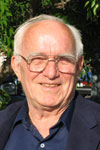About the Donor
 Albert Paulus
Albert Paulus was born on February 28, 1927, in Glendo, WY. During his formative years, he became acquainted with farming by working with crops, such as wheat, barley, and bean, and on a ranch raising Hereford cattle. Al was an active 4-H member for 10 years. He won the Walgreen Home Ground Improvement National Award and a trip to the National 4-H Congress in Chicago in 1943. During his years in 4-H, he also won the Wyoming State Fair Vegetable Judging Contest and a trip to Great Western Stock Show in Denver.
Al joined the Marine Corps in 1945 and was stationed at the Depot of Supply in San Francisco, where he arranged for supplies to be shipped to a 1,200-man unit in the Pacific area of operations.
Al returned to his home state to attend the University of Wyoming on an honors scholarship and received his B.S. degree in agronomy in 1950 and an M.S. degree in agronomy in 1951 from said institution under the guidance of Professor G. H. Starr. Al completed his education by attending the University of Wisconsin at Madison and received his Ph.D. degree in plant pathology in 1954 with Professor Glenn Pound.
In 1954, Al joined the faculty of the University of California at Riverside (UCR), where he remained until he retired in December 2001. During his tenure at UCR, Al specialized in providing information through applied research on the cause and control of plant diseases on vegetables, ornamentals, strawberries, sugar beet, cotton, avocado, and citrus crops. Al was a great cooperator and worked with a wide range of growers, farm advisors, students, chemical companies, and faculty. He cooperated with Professor Wilhelm at the University of California-Berkeley; Richard Storkan, who was president of TriCal; and Harold Lembright from Dow in developing a preplant soil fumigation treatment of methyl bromide/chloropicrin for the control of Verticillium wilt and other soilborne diseases of strawberry, tomato, and ornamentals. This treatment controlled diseases, increased yields, and enabled growers to continue to use the same ground for profitable production for the past 40 years.
Al remained a proponent of controlling soilborne diseases in his role as chair of the Selection Committee of the Storkan-Hanes-McCaslin Foundation. The foundation provides yearly scholarships to graduate students involved in all aspects of soilborne diseases. Al also cooperated with professors Middleton and Kendrick at UCR in identifying air pollutants affecting crop plants in California. He was a member of the Council for Agricultural Science and Technology and worked on the problem of finding and registering pesticides for minor uses. Many of these pesticides had never been registered and were declared illegal for use by growers at the time in l977.
Al was always interested in evaluating new products for disease control, as well as reevaluating older recommendations where necessary. In 1966, northern California citrus growers stated that Bordeaux mixture was not controlling bacterial blight caused by a Pseudomonas sp. Cooperative research with UCR plant pathologists and local UC Cooperative Extension farm advisors determined that growers were using a lesser amount of Bordeaux mixture than previously recommended. Subsequent research proved that a 10-10-100 Bordeaux mixture was needed for excellent control.
Head smut of sweet corn became an economic problem in southern California in 1971. A range of cultivars of sweet corn seed was obtained and planted in southern California fields. The local farm advisor and Al established that the currently grown cultivar, Bonanza, was extremely susceptible to head smut but numerous other varieties showed high resistance. These new cultivars solved this disease problem in southern California. In recent years, Don Cooksey, UCR, and Al, with the help of Miguel Vilchez and Mellano and Company, demonstrated the value of hot chlorine treatment of both seed and tuber of Ranunculus for eradication of Xanthomonas campestris.
Over the years, Al served as president of the Pacific Division of APS, program chair for the APS Pacific Division, associate editor of Phytopathology, APS Foundation secretary, and was named an APS Fellow in 1981. Al was president of Gamma Sigma Delta and won the Chancellor’s Founders Award, as well as the Hilgard Award for Outstanding Applied Research, all from the UCR. Al acted as a graduate student advisor and was always involved in the practical development of many students through field classes, research, and diagnostics. Al’s willingness to share his expertise is shown by his involvement in consulting both universities and governments in Australia, Chile, Ecuador, Egypt, England, France, Germany, Israel, Mexico, Pakistan, Peru, Columbia, Russia, and Spain.
Al passed away May 23, 2018 at the age of 91.
This fund was established by colleagues and friends to honor the contributions that Albert Paulus has made to the science of plant pathology. The first travel award was given at the 2006 APS/CPS/MSA Joint Meeting in Québec City, Québec, Canada.
